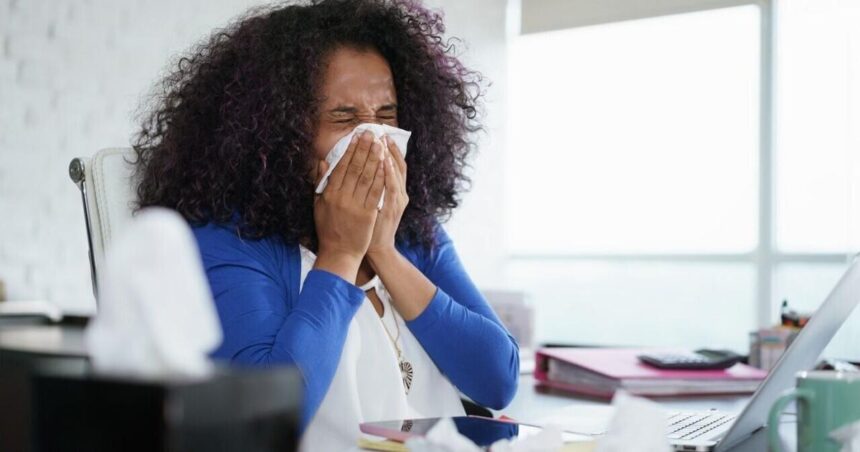In the United States, the average employee works 10 and a half days per year while feeling under the weather. 47% admit they’d rather “power through” than take a sick day. Some may be more inclined to “power through” as they’re worried, while others may think they’re “dramatic” when they’re feeling unwell. That’s according to a study conducted by OnePoll on behalf of Nectar Allergy.
Before the COVID-19 pandemic, taking a sick day for a cold or a minor illness was nearly unheard of. However, the pandemic changed many common workplace stigmas. Now, as we continue to move back into an era that looks more like the workplace before the pandemic, workers are reverting back to the old ways of working through illnesses.
The Health Stigma
In the United States, about 129 million people suffer from a chronic illness, and about 6.6% of the population are immunocompromised. Sometimes, we have no idea what our friends, family, and co-workers are fighting when it comes to their health.
The survey found that 48% of respondents remember a negative comment someone else made about how frequently they feel unwell, either due to allergies or other conditions and illnesses and over a quarter of those surveyed said in their friend group or family, they feel like they’re the person who is most often sick or feeling unwell.
These illnesses often make it difficult for people to keep up with everyday life. Along with taking days off from work, respondents missed about 17 social events in an average year because they felt unwell. Missing out on work and life with their friends and family can put a strain on the wallets and mental well-being of people who are already dealing with serious complications from their illnesses.
It’s Allergies, I Swear
While a cold, the flu, or other sickness was the biggest cause of respondents missing out on social events, allergies also played a role for a third of respondents.
In fact, half of all respondents (49%) suffer from yearlong or seasonal airborne allergies. Although a third (31%) of respondents experience FOMO or the fear of missing out due to feeling unwell, those with allergies are extra anxious about missing out compared to respondents without allergies (43% vs. 19%).
“It’s disheartening to see how much pressure people feel to work while unwell. Along with that, how many important occasions people miss because they’re sick, either with a cold or allergies. People don’t realize how isolating airborne allergies can be. They’re like an invisible cloud hanging over people’s heads,” explains Kenneth Chahine, Ph.D., Chief Executive Officer and co-founder of Nectar Allergy.
“According to the study, over half of people with allergies (54%) said they’re worried about not being able to tell the difference between allergy symptoms and a contagious cold. No wonder people miss out on so much.”
Feeling under the weather impacts work and respondents’ social lives and relationships, as well as their wallets.
The average person with allergies spent $207.30 in the last year to treat allergies and symptoms; 64% more than the $126.20 an average respondent without allergies spent to treat regular colds.
Allergies also affect respondents’ time. About 65% of allergy sufferers said they allocate extra time in their typical morning routine during peak allergy season to allow allergy medications to kick in and for symptoms to subside.
Along with time and money considerations, allergies can influence major life decisions: Almost half of those with allergies (46%) said they’d even be likely to move to a different city if it meant that their allergies would be less intense or go away completely.
“Whether you’re frequently sick with colds or are engaged in a battle with airborne allergies, it’s important to rest and give yourself the time you need to feel your best,” points out Shyam Joshi, M.D., chief scientific officer at Nectar Allergy.
“And if you’re finding that your sick days are stacking up, you’re frequently missing out on social events, your wallet is taking a hit and your lifestyle has shifted dramatically, know that you deserve better and there are new innovative and cost-effective treatments.”





